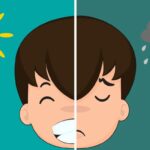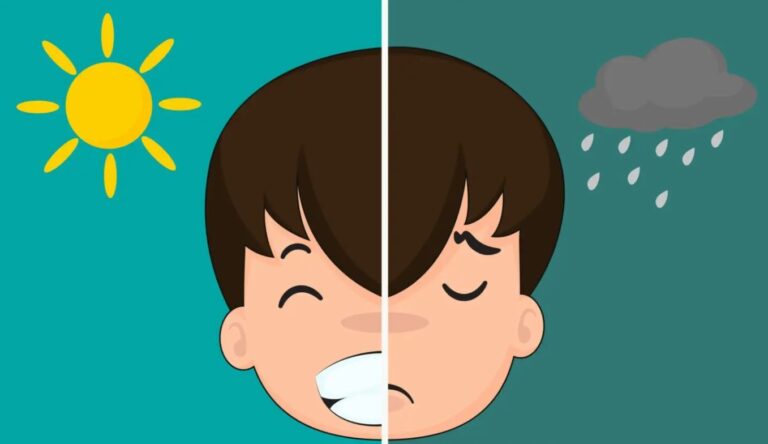Schizophrenia impacts nearly 1% of the global population, and symptoms often surface during late teens or early 20s. This can tremendously interrupt crucial formative years.
The condition varies between individuals, but common experiences include distortions in thought processes, difficulty discerning reality from imaginings, and disconnects with self and surroundings. Such disruptions make advancing into new responsibilities feel threatening or impossible without support.
While modern science continues learning more each day, we have yet to fully understand the biological and emotional roots of this illness.
Causes of Schizophrenia

Schizophrenia stems from a mix of genetic and biological factors interacting with life experiences. (1) DNA can increase odds but doesn’t seal fate. Brain differences emerge during development alongside environmental impacts, especially in youth.
Genetic Factors
Its genesis involves natural predispositions manipulated by external forces over time. Exact causes remain ambiguous due to variable presentations and a lack of a single trigger.
Evidence shows schizophrenia has a significant hereditary component. Having a close family member with it increases one’s own risk. (2)
Identical twin studies find a 50% concordance rate, demonstrating genetics play a strong role. Certain genes associated with neurological processes have been tied to elevated chances.
DISC1, COMT, and NRG1 are some that research has implicated due to their involvement in brain development, chemical signaling, and neuronal connectivity – areas relevant to symptoms.
The disorder is estimated to be around 80% heritable. This high percentage underscores genes as an important piece of the disease puzzle.
However, genes are not destiny. Their effects interact with environmental influences to ultimately manifest differently in each case.
External Factors
Research finds prenatal influences, like infections that assail a fetus or nutritional deficits that starve developing cells, can manipulate delicate in-utero processes in risk-boosting ways. Even severe stress endured by the mother affects her child’s journey. (3)
After birth, challenges like abuse, lack of safety, or exposure to urban elements like pollution carry implications too. All such experiences sculpt neural pathways underlying behavior – for better or worse.
Additionally, adolescent behaviors like cannabis use may not ’cause’ conditions like schizophrenia alone, but their ability to disrupt still-changed brains warrants concern. Particularly when certain souls face a heavier genetic load to start.
Neurobiological Factors
Brain imaging and post-mortem studies provide evidence that physical differences exist in the brains of people with schizophrenia. (4)
Enlarged ventricles and reduced gray matter volume in important regions like the prefrontal cortex and hippocampus have been frequently observed.
Abnormalities in white matter integrity, especially in frontal and temporal lobes, suggest disruptions to neural connectivity pathways.
It’s also clear that imbalances in neurotransmitter systems, particularly dopamine and glutamate, play a role.
The dopamine hypothesis points to too much activity in the mesolimbic pathway possibly causing psychotic symptoms. Not enough in the mesocortical area may underlie negative symptoms.
Issues with NMDA receptor function and glutamate signaling are also implicated based on evidence like reduced levels and function. (5)
Other neurotransmitters like serotonin and GABA likely intersect in complex ways too, further complicating the neurological picture.
Symptoms of Schizophrenia

There are three main types of symptoms associated with schizophrenia: positive, negative, and cognitive.
Positive Symptoms
Hallucinations involve the senses being fooled. Most commonly in schizophrenia, individuals hear voices even when none are there. Less frequent are visual hallucinations where things are seen that don’t exist.
Delusions are stubborn beliefs that can’t be logically disproven. Some common types are paranoid delusions where a person feels they are being threatened. Another is grandiose delusions like believing one has special abilities greater than what’s real.
Negative Symptoms
People may seem less animated or “flat” when interacting due to having a hard time conveying feelings externally through facial expressions, tone of voice, etc.
Avolition relates to lacking initiative or motivation. Individuals tend to have a low drive to start or keep doing things over time. This can cause problems with basic self-care, pursuing work/education, or socializing due to insufficient energy or interest.
Social withdrawal means limiting interactions with others. As connections with friends and family weaken, isolation often increases. Loneliness can grow as interaction and shared experiences become fewer between the person and their social network.
Cognitive Symptoms
Focus and attention span are often compromised, as the mind finds it harder to remain concentrated on one task or conversation thread at a time.
Short-term memory challenges mean new information and schedules are more difficult to remember moment-to-moment or hour-to-hour.
Executive functions like decision-making and problem-solving also tend to be impaired. It becomes harder to plan out activities step-by-step and find solutions to issues that arise.
This translates to greater struggles with independent living if support is not available. Everyday routines, responsibilities, and social interactions require cognitive skills that may be weakened.
Treatment of Schizophrenia

Managing schizophrenia requires a special approach combining medication and therapy.
Medications
Antipsychotic medications are important for stabilizing schizophrenia symptoms.
Early drugs reduced psychosis but caused stiffness. Newer second-generation medications control psychosis and negative symptoms better with less stiffness risk. Drugs like risperidone and olanzapine are commonly used.
Some experimental drugs showed promise in clinical trials for helping treatment-resistant cases or reducing side effects from other drugs.
Medication allows symptom relief and improved functioning for many. It’s key to managing the condition long-term.
Psychosocial Therapies
CBT teaches patients to recognize and change distorted thoughts and behaviors. It helps manage psychotic symptoms by developing coping strategies to reduce distress.
Social skills training improves interpersonal skills and social interactions. It helps individuals build relationships, communicate effectively, and integrate into society.
Family therapy involves relatives in treatment. It educates them about schizophrenia and provides support strategies while managing stress from caregiving duties.
Last Words
As researchers learn more over time about what makes schizophrenia different for each person, they find even better treatments. It gives hope that people can feel better and live fulfilling lives even when dealing with mental health issues. Working together, we can continue pursuing new solutions.
References
- Gejman PV, Sanders AR, Duan J. The role of genetics in the etiology of schizophrenia. Psychiatr Clin North Am. 2010 Mar;33(1):35-66. doi: 10.1016/j.psc.2009.12.003. PMID: 20159339; PMCID: PMC2826121.
- Cardno AG, Owen MJ. Genetic relationships between schizophrenia, bipolar disorder, and schizoaffective disorder. Schizophr Bull. 2014 May;40(3):504-15. doi: 10.1093/schbul/sbu016. Epub 2014 Feb 24. PMID: 24567502; PMCID: PMC3984527.
- Brown AS, Derkits EJ. Prenatal infection and schizophrenia: a review of epidemiologic and translational studies. Am J Psychiatry. 2010 Mar;167(3):261-80. doi: 10.1176/appi.ajp.2009.09030361. Epub 2010 Feb 1. PMID: 20123911; PMCID: PMC3652286.
- Brown R, Colter N, Corsellis JAN, et al. Postmortem Evidence of Structural Brain Changes in Schizophrenia: Differences in Brain Weight, Temporal Horn Area, and Parahippocampal Gyrus Compared With Affective Disorder. Arch Gen Psychiatry. 1986;43(1):36–42. doi:10.1001/archpsyc.1986.01800010038005
- Rubio MD, Drummond JB, Meador-Woodruff JH. Glutamate receptor abnormalities in schizophrenia: implications for innovative treatments. Biomol Ther (Seoul). 2012 Jan;20(1):1-18. doi: 10.4062/biomolther.2012.20.1.001. PMID: 24116269; PMCID: PMC3792192.
Related Posts:
- What Is Depression? Causes, Symptoms, and Treatment
- What is Anxiety? Causes, Symptoms, and Treatment
- What is Schizoaffective Disorder? Causes, Symptoms,…
- What is Bipolar Disorder? Causes, Symptoms, and Treatment
- What is Post Trauma Stress Disorder (PTSD)? Causes,…
- Residential Treatment Centers for Schizophrenia in Florida













